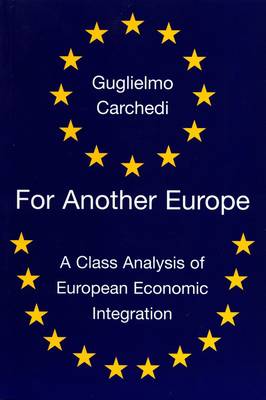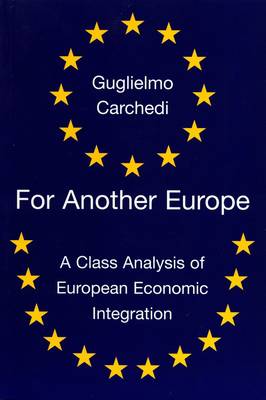
- Afhalen na 1 uur in een winkel met voorraad
- Gratis thuislevering in België vanaf € 30
- Ruim aanbod met 7 miljoen producten
- Afhalen na 1 uur in een winkel met voorraad
- Gratis thuislevering in België vanaf € 30
- Ruim aanbod met 7 miljoen producten
Zoeken
For Another Europe
A Class Analysis of European Economic Integration
Guglielmo Carchedi
Paperback | Engels
€ 22,95
+ 45 punten
Omschrijving
In this innovative work, Guglielmo Carchedi argues that only an analysis centered on class as the basic unit of social life, with production and distribution of value understood as the bedrock of the economy, can throw light on the internal contradictions of European economic integration. Two specific themes emerge from this radical approach. First, familiar topics such as competition and social policy, economic and monetary union, the Common Agricultural Policy and immigration, are treated in an original manner. Second, subjects usually ignored in the standard textbooks, for instance the role of interest groups in the Union's decision-making process, are shown to be of crucial importance in understanding the economics of the European Union. This work therefore provides both an introduction to and a critique of the European project. The book's central message however, is that another sort of Europe is possible, one based on the erosion of economic polarization, on the abolition of Europe's imperialist relations with the Third World, and on the creation of truly democratic institutions of self-determination.
Specificaties
Betrokkenen
- Auteur(s):
- Uitgeverij:
Inhoud
- Aantal bladzijden:
- 312
- Taal:
- Engels
Eigenschappen
- Productcode (EAN):
- 9781859843192
- Verschijningsdatum:
- 17/05/2001
- Uitvoering:
- Paperback
- Formaat:
- Trade paperback (VS)
- Afmetingen:
- 157 mm x 234 mm
- Gewicht:
- 498 g

Alleen bij Standaard Boekhandel
+ 45 punten op je klantenkaart van Standaard Boekhandel
Beoordelingen
We publiceren alleen reviews die voldoen aan de voorwaarden voor reviews. Bekijk onze voorwaarden voor reviews.








